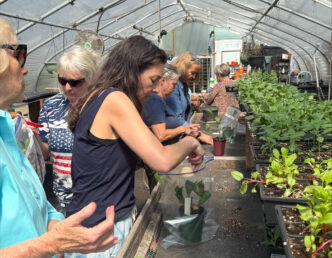Clemson University’s Sustainable Packaging Innovation Lab (SPIL) has awarded $2.5 million to support the development of cutting-edge sustainable packaging solutions.
These efforts are aimed at ensuring U.S. specialty crops remain competitive in global markets, particularly the European Union and Canada, where new regulations are phasing out plastic and requiring recyclable or compostable alternatives for produce packaging.
“This lab is all about enabling U.S. specialty crop exporters to succeed in markets that now demand sustainable packaging,” said James Sternberg, assistant professor of sustainable packaging at Clemson and a leader of the initiative. “We’re building the future of ag packaging with real-world technologies that ensure compliance and competitiveness.”
The new international regulations aim to eliminate single-use and small-quantity packaging in favor of bulk bins for produce under 1.5 kg. According to the regulations, plastic used in packaging must contain more post-consumer recycled content. The regulations also seek to eliminate shrink wrap and require compostable labels on produce, so everything can be composted together, enhancing sustainability.
These regulations follow efforts by the United Nations to reduce plastic waste globally and work toward a Global Plastics Treaty.
SPIL is funded through the USDA Foreign Agricultural Service’s $5 million Sustainable Packaging Innovation Lab at Clemson University and launched through the Assisting Specialty Crop Exports (ASCE) initiative.
Grantees tackle packaging challenges across the supply chain
SPIL has selected 13 innovation projects for funding, each representing a crucial step toward compliance with foreign regulations and a more circular global economy. Among the standout recipients:
Michigan State University (East Lansing, Mich.)
Project: Pilot-Scale Testing of Recyclable and Compostable All-Purpose Corrugated Boxes for Specialty Crops Exports
Packaging Solution: Recyclable and compostable corrugated boxes for fresh and minimally processed specialty crops
Nvirovate Materials (Seattle, Wash.)
Project: Compostable Produce Look Up Labels: Ensuring US Export Compliance & Growth
Packaging Solution: Compostable adhesive
University of Missouri (Columbia, Mo.)
Project: Development of novel translational sprayable coating materials for antimicrobial food packaging
Packaging Solution: Sprayable antimicrobial coatings for reusable packaging
Clemson University (Clemson, S.C.)
Project: Development of Cross-linked Starch-Based Barrier Coating Materials for Paper Packaging of Almonds
Packaging Solution: Paper packaging
BioLogiQ Inc. (Idaho Falls, Idaho)
Project: Piloting of BioBlend Technology for Sustainable Specialty Crop Packaging and Scale-up
Packaging Solution: Sustainable specialty crop packaging
Virginia Tech (Blacksburg, Va.)
Project: Scaling Up Sustainable Chitin Nanofiber Packaging Technology for Energy-Efficient Specialty Crop Exports
Packaging Solution: Passive cooling packaging for energy efficiency
Vireo Advisors (Jamaica Plain, Mass.)
Project: Advancing commercialization of a cellulose-based food coating: establishing a food-grade production process and achieving regulatory approval for new applications in specialty crops
Packaging Solution: Edible cellulose-based coating
Clemson University (Clemson, S.C.)
Project: Compostable Price-Look-Up Stickers and Labels from Plant-derived Plastics
Packaging Solution: Compostable price look-up stickers and labels
University of Georgia Research Foundation (Athens, Ga.)
Project: Scale-up and Pilot Production of Home Compostable Label Adhesive for Fresh Produce
Packaging Solution: Home compostable adhesive for produce labeling
NatureSweet (San Antonio, Texas)
Project: Less Virgin Plastic, More Sustainability: A Circular Packaging Approach for Snacking Tomatoes
Packaging Solution: Circular packaging approach at lab-scale validation
University of Maine (Orono, Maine)
Project: Development of Fully Recyclable Cellulose-based Packaging for Berry Export, in partnership with Sappi and Cal Poly Strawberry Center
Packaging Solution: Fully recyclable cellulose-based packaging
It’s Fresh Limited (Burntwood, United Kingdom)
Project: Reducing produce wastage and increasing sustainability in the US fresh berry industry through implementation of active ethylene-controlling, paper-based packaging for both export and retail
Packaging Solution: Ethylene adsorbing ink printed on cardboard substrate
Metalchemy (London, United Kingdom)
Project: Development of Biodegradable Agar-Cellulose Active Packaging for Specialty Crop Exports
Packaging Solution: Biodegradable agar-cellulose active packaging
A platform for U.S. export success
The $143 billion specialty crop export industry faces steep challenges as foreign regulations grow more complex. SPIL-funded innovations offer export-ready packaging that meets Canada and Europe’s bans on single-use plastics, requirements for recycled content, and mandates for compostable materials.
“Packaging is no longer just a container — it’s a passport to global markets,” said Andrew Hurley, Director of Research for Clemson FRESH. “With SPIL, we’re helping exporters navigate regulatory complexity with confidence and agility.”
High ROI on Public Dollars
These early-stage projects, many still pre-commercial, are using SPIL funding to accelerate market readiness, obtain necessary certifications (such as BPI, TUV, ASTM D6400), and launch pilot-scale production. The lab’s cross-disciplinary approach — integrating food science, materials engineering, and policy — ensures each packaging innovation is tested not just for performance, but for real-world viability and economic impact.
About SPIL
The Sustainable Packaging Innovation Lab (SPIL) is a national R&D and commercialization platform that unites Clemson’s Department of Food, Nutrition and Packaging Science (FNPS) faculty with expertise in areas such as chemical synthesis and recycling of polymers; organic composting and lifecycle analysis; antimicrobial and biodegradable films; active and intelligent packaging; package and material testing; polymer processing and mechanical recycling; and postharvest biology.
For more information or to explore partnerships, contact Clemson’s packaging science department. Additional information about the USDA Foreign Agricultural Service’s support to U.S. specialty crop producers is available here: https://www.fas.usda.gov/programs/assisting-specialty-crop-exports-asce-initiative







